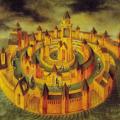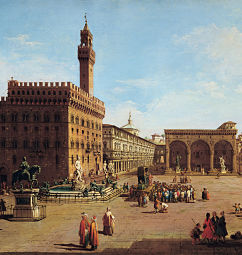352. The Teacher of Our Actions: Renaissance Historiography
Bruni, Poggio, Machiavelli, and Guicciardini explore political ideas and historical method in works on Roman and Italian history.
Themes:
• M. Cesa, Debating Foreign Policy in the Renaissance: Speeches on War and Peace by Francesco Guiccardini (Oxford: 2017).
• A.H. Gilbert (trans.), Niccolò Machiavelli: Chief Works and Others, 3 vols (Durham: 1965).
• J. Hankins (trans.), Leonardo Bruni, History of the Florentine People, 2 vols (Cambridge MA: 2001 and 2004).
---
• M. Colish, “Machiavelli’s Art of War. A Reconsideration,” Renaissance Quarterly 51 (1998), 1151-68.
• S. de Maria, “Machiavelli’s Ironic View of History: the Istorie fiorentine,” Renaissance Quarterly 65 (1992), 248-70.
• F. Gilbert, Machiavelli and Guicciardini: Politics and History in Sixteenth Century Florence (Princeton: 1965).
• G. Ianziti, Writing History in Renaissance Italy: Leonardo Bruni and the Uses of the Past (Cambridge MA: 2012).
• F. Krantz “Between Bruni and Machiavelli: History, Law and Historicism in Poggio,” in P. Mack and M.C. Jacob (eds), Politics and Culture in Early Modern Europe (Cambridge: 1987), 119-52.
• M. Phillips, Francesco Guicciardini: The Historian’s Craft (Toronto: 1977).
• N. Struever, The Language of History in the Renaissance: Rhetorical Consciousness in Florentine Humanism (Princeton: 1970).
• D.J. Wilcox, The Development of Florentine Humanist historiography in the Fifteenth Century (Cambridge MA: 1969).







Comments
Source for Scala Quote
Starting at 16:38, you make reference to historian Bartolomeo Scala criticizing other historians who 'want to trace everything back to antiquity and omit with silence much that has been changed or innovated since then.'" From which source do you derive this astute remark? If this is from a work in English, could you, if possible, please cite its source for the quote in Italian?
Perhaps Scala didn't intend this, but his criticism can apply further to idealists and politicians, who hearken back with nostalgia to bygone eras they have themselves not lived yet praise as Golden Ages. Such thinkers are probably ignorant that the idea of learning from history so that we may hope to repeat comes from such a figure as Machievelli, but I suspect they're also ignorant of the many aspects of history overlooked and forgotten, which "have been changed and innovated" upon, that wear down the golden luster of the past. If we are to learn from history, we cannot ignore the bad things in favor of remembering the great things, as if they are mutually exclusive. How could we then know if the bad things made the great things possible? An optimism of the past betrays a blindness of the present and for the future. What we don't know can, indeed, doom us.
In reply to Source for Scala Quote by JerryL
Scala quote
I took this from F. Gilbert, Machiavelli and Guicciardini: Politics and History in Sixteenth Century Florence (Princeton: 1965), page 215. Sorry, that may not be so helpful if you can't get your hands on the book, but I myself got it out of the library and have returned it not so I can't check what Gilbert's exact reference would have been. But I guess that it would be from Scala's own History of Florence. It is indeed a nice quote!
In reply to Scala quote by Peter Adamson
Many thanks! Your citation
Many thanks! Your citation was more helpful than you realize. Gilbert's book was available to borrow for an hour on the Internet Archive. For anyone who happens to be interested, the quote by Scala seems to have been translated by Gilbert from a Latin passage found within a book written by the German scholar Johann Georg Graevius:
"Quamobrem non mediocri reprehensione dignos putarem nonnullos, qui dum omnia ad antiquitatem referre volunt, multa quae ut sint, immutata ac penitus innovata jam sunt, aut taciti praetereunt, aut insomnia quaedam vel monstra potius edere compelluntur". (Source, as quoted by F. Gilbert: "Scala, 'Vita Vitaliani Borrhomaei' in Graevius' Thesaurus Antiquitatum et Historiarum Italiae, vol. VIII, part I, Leydan, 1723, p. 84.")
Since I can't read Latin, I'll have to leave it to others to offer a translation of the entire passage.
In reply to Scala quote by Peter Adamson
Here's another Gilbert
...And the idiot who praises in enthusiastic tone
All centuries but this and every country but his own
Add new comment